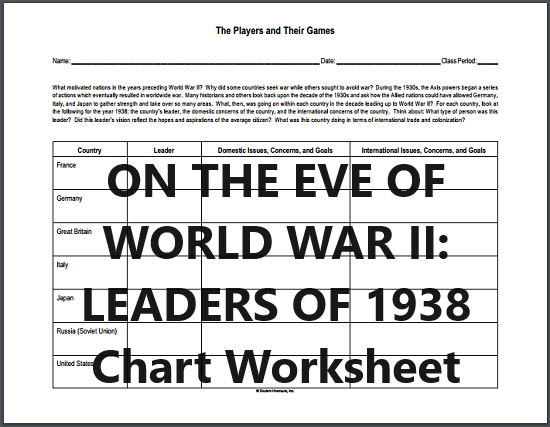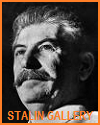| Players and Their Games Worksheet Chart Worksheet |
|---|
| www.studenthandouts.com ↣ World History ↣ Rise of Dictatorships ↣ Dictatorships Worksheets |
|
What motivated nations in the years preceding World War II? Why did some countries seek war while others sought to avoid war? During the 1930s, the Axis powers began a series of actions which eventually resulted in worldwide war. Many historians and others look back upon the decade of the 1930s and ask how the Allied nations could have allowed Germany, Italy, and Japan to gather strength and take over so many areas. What, then, was going on within each country in the decade leading up to World War II? For each country, look at the following for the year 1938: the country’s leader, the domestic concerns of the country, and the international concerns of the country. Think about: What type of person was this leader? Did this leader’s vision reflect the hopes and aspirations of the average citizen? What was this country doing in terms of international trade and colonization? |
 |
   |
|
Click here to print this worksheet (PDF file). Answers will vary. In 1938, the leaders of major world powers were: France: Édouard Daladier served as the Prime Minister of France in 1938. He played a prominent role in European diplomacy during the lead-up to World War II. Germany: Adolf Hitler was the Chancellor of Germany and its dictator. He pursued aggressive expansionist policies that would eventually lead to World War II. Great Britain: Neville Chamberlain was the Prime Minister of the United Kingdom in 1938. He is famously associated with the policy of appeasement toward Hitler's expansionism. Italy: Benito Mussolini was the Prime Minister and dictator of Italy. He led the National Fascist Party and was an ally of Nazi Germany. Japan: Emperor Hirohito was the constitutional monarch of Japan. While the political leadership in Japan shifted frequently during this period, Hirohito remained a symbol of national unity. Russia: In 1938, the Soviet Union was led by Joseph Stalin. He was the General Secretary of the Communist Party and the de facto ruler of the USSR. United States: In 1938, Franklin D. Roosevelt was the President of the United States. He would go on to play a significant role in U.S. foreign policy during World War II. These leaders were instrumental in shaping the events of the late 1930s, a period marked by increasing tensions and the eventual outbreak of World War II. |
| www.studenthandouts.com ↣ World History ↣ Rise of Dictatorships ↣ Dictatorships Worksheets |








